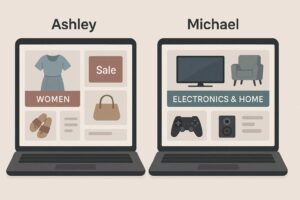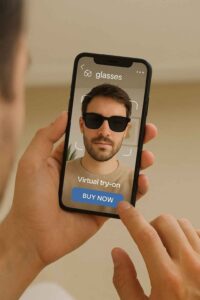A Digital Shift Redefining GCC Marketing
As the GCC region moves toward a more digital future, marketing is changing in a big way. With new AI tools, people wanting more honest content, and fast-growing digital platforms, businesses need to update how they reach their customers.
In 2025, staying ahead in the GCC means more than just going digital—it means being agile, human-centric, and technology-forward. This article outlines seven transformative trends that businesses in Saudi Arabia, the UAE, Qatar, and beyond must embrace to remain competitive and relevant.
AI is No Longer Optional—It’s Your Marketing Engine
Artificial Intelligence (AI) has gone from being a new idea to a key part of marketing. In the GCC, where digital technology is growing fast, AI is helping businesses understand their customers better and make smarter decisions.
AI is now used to:
- Predict consumer behaviour through real-time analytics
- Automate repetitive tasks like email scheduling or A/B testing
- Generate personalized content based on browsing patterns
- Enhance customer service via AI-powered chatbots and virtual assistants
Companies using AI-driven marketing tools report increased engagement, improved conversion rates, and lower customer acquisition costs. For example, banks in the UAE are using AI to tailor loan and investment recommendations to individual customers based on their financial profiles.

Short-Form Videos Are Winning Attention and Action
In today’s mobile-first culture, short-form video content has emerged as the most impactful way to capture user attention—and the GCC is no exception. With platforms like TikTok, Instagram Reels, and YouTube Shorts gaining massive traction in the region, video marketing has shifted from a “nice-to-have” to a must-have.
These bite-sized videos work because:
- They deliver value quickly—within 15–60 seconds
- They are easily shareable and algorithm-friendly
- They allow businesses to tell compelling stories without big budgets
Brands are using them to:
- Showcase product demos
- Share testimonials
- Offer quick tips or behind-the-scenes glimpses
- Host flash sales or countdowns
In 2025, companies not using short-form videos risk being invisible to younger, tech-savvy audiences.
User-Generated Content (UGC) is the New Social Proof
In the age of scepticism, authenticity matters more than polish. Consumers in the GCC trust real people—friends, family, and influencers—over corporate messages. That’s why user-generated content (UGC) is one of the most effective tools for building trust.
UGC includes:
- Photos or videos of customers using your product
- Social media shout-outs or tags
- Customer reviews and testimonials
- Influencer collaborations
Smart brands encourage UGC through:
- Hashtag campaigns
- Loyalty rewards for sharing experiences
- Featuring customer content on websites or social feeds
The result? A community that feels involved and invested. UGC can increase conversion rates by 29%, according to recent studies.

Hyper-Personalization is the Key to Customer Loyalty
Today’s consumers expect brands to know their needs, preferences, and timing—and in the GCC, where high-end personalization is becoming standard, meeting that expectation is essential.
Hyper-personalization uses real-time data, AI, and machine learning to craft highly relevant experiences at every touchpoint:
- Customized homepage content based on past browsing
- Targeted push notifications with timely offers
- Personalized product recommendations
- Dynamic pricing or loyalty offers based on purchase history
For example, a fashion e-commerce site in Dubai might show different collections based on the local weather or holidays in the customer’s region.
Benefits of hyper-personalization:
- Higher customer retention
- Increased average order value
- Enhanced customer satisfaction

SEO Is Now Conversational and AI-First
SEO has come a long way from keyword stuffing. In 2025, search engines are powered by AI and increasingly respond to natural language queries—the kind users ask voice assistants or chatbots.
This means your content needs to:
- Answer specific questions clearly (think: “What is the best coffee shop in Abu Dhabi?”)
- Be structured with headings, bullet points, and FAQs
- Match user intent, not just search terms
Also, Google’s Search Generative Experience (SGE) and tools like Perplexity AI are favouring pages that provide concise, authoritative answers.
Tips for GCC businesses:
- Use regional language or slang where relevant
- Focus on long-tail keywords (e.g., “halal meal plans in Dubai for busy professionals”)

Social Media is Now a Direct Sales Engine
Social platforms in 2025 are more than just community spaces—they are fully integrated sales channels. TikTok Shop, Instagram Checkout, and WhatsApp Commerce allow users in the GCC to browse, chat, and buy—without ever leaving the app.
Social commerce is particularly powerful because:
- It removes friction in the buyer’s journey
- It integrates social proof (likes, comments, shares)
- It makes product discovery feel organic
Strategies for success:
- Add product tags to posts and stories
- Use influencers to demo and review products
- Launch limited-time drops through live sessions
With over 70% of young GCC consumers discovering brands through social media, the message is clear: if you’re not selling socially, you’re leaving money on the table.

Immersive Marketing: AR & VR Are Shaping Experiences
The adoption of Augmented Reality (AR) and Virtual Reality (VR) is rising across GCC industries—from luxury retail to real estate. These technologies offer interactive, immersive experiences that traditional media simply can’t match.
Examples of AR/VR in GCC marketing:
- A beauty brand offering AR-based virtual try-ons for lipstick shades
- A real estate developer offering VR walkthroughs of under-construction apartments
- An auto company letting users “test drive” a car through VR headsets
These tools don’t just entertain—they reduce return rates, increase engagement, and enhance purchase confidence.
Even small businesses can get in on the trend through:
- AR Instagram filters
- 360° product views
- Google Swirl 3D ads
Conclusion
Marketing is changing quickly, and GCC businesses that keep up will do well. Whether you’re a new company or a big brand, using these seven trends will help you connect better with customers, increase sales, and prepare your business for the future.
Next Steps for Businesses:
- Start small: Choose one or two trends to implement this quarter.
- Test, learn, and scale: See what works with your audience.
- Keep your content human, helpful, and highly relevant.






